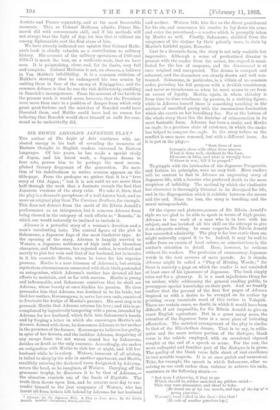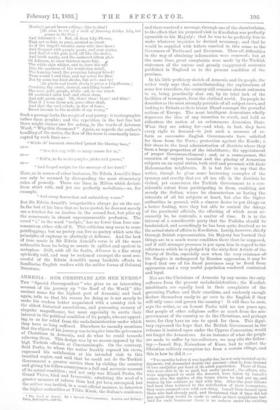SIR EDWIN ARNOLD'S JAPANESE PLAY.*
Tien author of The Light of Asia continues with un- abated energy in his task of revealing the treasures of Eastern thought to English readers unversed in Eastern languages. Of late years, he has made a special study -of Japan, and his latest work, a Japanese drama in lour acts, proves him to be perhaps the most accom- plished literary dragoman of the generation. No men- tion of his indebtedness to native sources appears on the title-page. From the prologue we gather that it is a "true story of Old Japan ; " but it is not until we are more than half through the work that a footnote reveals the fact that Japanese versions of the story exist. We take it, then, that the play is a dramatic paraphrase of a well-known book, and no more an original play than The Corsican Brothers, for example. This does not detract from the merit of Sir Edwin Arnold's performance as an interpreter, but it removes Adzuma from being classed in the category of such efforts as " Romola," in which one would naturally be inclined to include it.
Adzarna is a powerful story of a woman's devotion and a man's unrelenting hate. The central figure of the plot is Sakamune, a Japanese Iago of the most vindictive type. At the opening of the story, Adzuma is happily married to Wataru, a Japanese nobleman of high rank and blameless character, and Sakamune, her rejected suitor, is resolved not merely to plot her ruin and that of ha husband, but to involve in it his comrade Morito, whom he hates for his superior prowess. Morito is a near kinsman of Adzuma's, but certain mysterious circumstances connected with their birth portended an antagonism, which Adzuma's mother has devoted all her -efforts to maintain, and so far with success. Morito is young and inflammable, and Sakamune contrives that he shall see Adzuma, whose beauty at once kindles his passion. He then persuades him that Adzuma was destined to be his bride, but that her mother, Koromogawa, to serve her own ends, contrived to frustrate the design of Morito's parents. His next step is to persuade Morito that Adzuroa returns his love; and this is ac- complished by ingeniously tampering with a poem, intended by Adzuma for her husband, which falls into Sakamune's hands, and by forging a letter in which she encourages Morito's ad- dresses. Armed with these, he denounces Adzuma to her mother in the presence of the former. Koromogawa believes her guilty, in spite of her denials, and the luckless Adzuma, despairing of any escape from the net woven round her by Sakamune, -decides on death as the only resource. Accordingly, she makes an assignation with Morito to visit her at night, and kill her husband while he is asleep. Wataru, innocent of all mishap, is lulled to sleep by his wife in another apartment, and Monte, stealthily entering the darkened room designated by Adzuma, severs the head, as he imagines, of Wataru. Carrying off the gruesome trophy, he discovers it to be that of Adzuma,— the situation reminds one of the finale of Rigoletto. The truth then dawns upon him, and he returns next day to sur- render himself to the just vengeance of Wataru, who has learnt all from letters left behind by Adzuma for her husband * Adzuma: or, the Japanese Wife. A Play in Four Acts. By Sir Edwin Arnold. London : Longtuane, Green, and Co.
and mother. Wataru bids him live as the direst punishment for his sin, and announces his resolve to lay down his arms and enter the priesthood,—a resolve which is promptly taken by Morita as well. Finally, Sakamune, shielded from the vengeance of his victims by their priestly vows, is slain by Morito's faithful squire, Kainehu.
Cast in a dramatic form, the story is not only readable but
impressive. Although a sense of predestined disaster is present with the reader from the outset, due regard is mani- fested for the law of suspense, and the demouement is at
once original and unexpected. The drama is compact and coherent, and the characters are clearly drawn and well con- trasted. Sakamune, in particular, is a villain of no common order, pursuing his fell purpose with a devilish consistency, and never so treacherous as when he most seems to err from an excess of loyalty. Matto, again, in whom chivalry is from time to time overborne by passion, is a striking figure; while in Adzuma herself there is something touching in the mixture of unsullied purity with the unconscious fascination which she exerts on her hereditary foe. For at the bottom of the whole story there lies the doctrine of reincarnation in its most fantastic form. Adzuma has been a snake, and Morito an eagle, in a previous state of existence, in which the snake has helped to conquer the eagle. In the story before us the conflict is once more renewed, but with a different issue. As it is put in the play,—
" Seen lives of men Intermix close with other lives unseen. What is done well, obedient to the Law, Blossoms in bliss, and what is wrongly done Withers to woe, 'till it be purged."
To grapple with the intricacies of the Japanese Purgatorio, and fathom its principles, were no easy task, Most readers will be content to find in Adzunta an engrossing story of Japanese life, with a heroine who preferred death to the mere suspicion of infidelity. The method by which she vindicates her character is thoroughly Oriental in its disregard for life, and in the disproportion which it exhibits between the means and the end. None the less, the story is touching and the moral unimpeachable.
Of the vigour and picturesqueness of Sir Edwin Arnold's
style we are glad to be able to speak in terms of high praise. Adzwana is the work of a man who is in love with his subject, and has lavished all his skill on the attempt to give it an adequate setting. In some respects, Sir Edwin Arnold has succeeded admirably. The play is far less exotic than one might naturally expect it to be. Indeed, it may be said to
suffer from an excess of kcal colour, so conscientious is the author's attention to detail. Here, however, he reckons without his readers. The profusion of unnecessary Japanese words in the text savours of mere parade. As it stands, Adzuma might be called a "Play of Missing Words ; " for there is scarcely a page on which the reader is not reminded at least once of his ignorance of Japanese. The book simply
cries out for a glossary. It is a most injudicious thing for an author, while addressing the general reading public, to presuppose special knowledge on their part. And we frankly confess that the perusal of the first few pages of Adzuma inspired us with a desire to be avenged on its author by printing every twentieth word of this review in Volapiik.
There are certain cases, no doubt, in which it would have been difficult, if not impossible, for Sir Edwin Arnold to give an exact English equivalent. But in a great many more, the retention of the Japanese form is a mere piece of irritating affectation. The metrical arrangement of the play is similar to that of the Elizabethan drama. That is to say, in solilo- quies and the more serious portion of the dialogue, blank verse is the vehicle employed, with an occasional rhymed couplet at the end of a speech or scene. For the rest, the more colloquial and familiar part of the dialogue is in prose. The quality of the blank verse falls short of real excellence
in two notable respects. It is at once garish and unmusical. Take, for example, the speech in which Sakamune, after re- solving to use craft rather than violence to achieve his ends, continues in the following strain :— "But were I otherwise, if that in me Which should be soldier matched my pitiless mind—
This way were pleasanter, and short to take : [He draws one of his two swords, and lops off the top of a young pine-tree.] Wataru's head rolled in the dust—like that !
[lle cuts off another pine-tree top.] Morito's proud brows rolling—like to that !
[He aims to cut off a stalk of flowering Golden Lily, but
pauses in the blow.]
And Adzumres—I But, oh thou Lily-Flower,
That art so fair, so pure, scouted so sweet As if the Angel's breaths came with thee here ; And dropped with purple gouts, and rosy stains,
And dusted with pale gold, all like the moles,
And birth•marks, and the timbered silken glow Of Adzuma, to show fairness more fair, • The white skin whiter, and to draw the eye Into the madness of the wondering mind, The longing hand, the yearning hungry blood Thus would I end thee, and my aches for thee Not by some too kind stroke, but so I—and so ! Pie plucks and breaks slowly to pieces a Lily-blossont._1
Crushing thy sweet, desired, unwilling heart—
The rose, gold, purple, white—all, to one wrack Of scattered satin leaf, and silver stem, And soft green cup ! Oh, thus ! thus ! thus ! and thus ! That if I wear them not, none other shall, And that thy soul exhale, in dew of tears, Sweet incense to the nostrils of my wrong."
Such a passage lacks the magic of real poetry it is oleographic rather than graphic; and the repetition in the last line but three might excuse one for asking, in the words of Artemus Ward, "Why this thusness P" Again, as regards the author's handling of the metre, the flow of the verse is constantly inter- rupted by such lines as— "While tie innocent stumbled 'gainst the blazing bars," or- " Sow the way with so many snares for us," " Earn, to fix so its purples, pinks and greens," or—
"And forged scripts for the message of her hand."
Here, as in scores of other instances, Sir Edwin Arnold's lines Can only be scanned by disregarding the most elementary rules of prosody. There are lines in Milton which deviate from strict rule, and yet are perfectly melodious,—as, for example, "And every flower that sad embroidery wears."
But Sir Edwin Arnold's irregularities always jar on the ear. In the last of his lines that we have quoted, he does not merely use a trochee for an iambus in the second foot, but piles up the consonants in almost unpronounceable profusion. The vowel " i," in the word "scripts," has no fewer than four con-
sonants on either side of it. This criticism may seem to some pettifogging ; but no poetry can live as poetry which sets the principles of euphony so glaringly at defiance. And the lack of true music in Sir Edwin Arnold's verse is all the more noticeable from its being so ornate in epithet and opulent in metaphor. Still, with all its faults, kizuma is a fine story spiritedly told, and may be reckoned amongst the most suc- cessful of Sir Edwin Arnold's many laudable efforts to familiarise English readers with the nobler forms of Oriental literature, or—



































 Previous page
Previous page